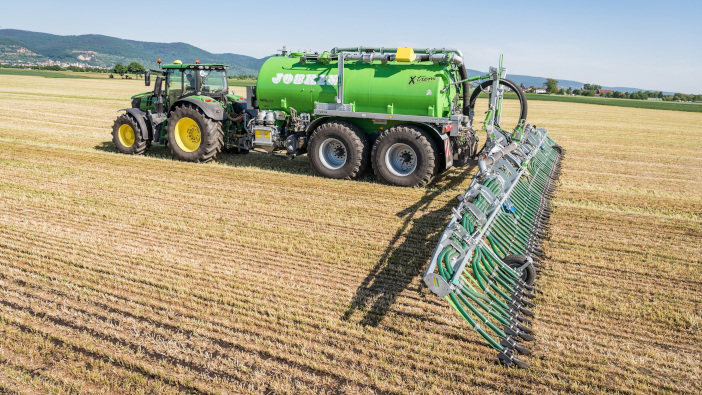Defra has announced grants of up to £250,000 to improve slurry storage to help farmers prevent water and air pollution, and make the best of organic nutrients.
According to Defra, around half of slurry stores in England are not fit for purpose, forcing growers to spread slurry when there is no crop need. This could lead to farms failing to comply with their legal obligations for storage and slurry spreading.
The first round of the Slurry Infrastructure grant, which will be administered by the Rural Payments Agency, will open for applications on the 6th of December, making £13 million available for livestock farmers to facilitate the building of six months of storage capacity.
The grant will run for multiple years, with farmers able to apply for between £25,000 and £250,000 towards the cost of slurry stores, covers and supporting equipment. The money can be used to build, replace or expand stores, as well as contribute to other solutions like lagoons, ring tanks and large slurry bags.
Farming Minister Mark Spencer said: “We know livestock farmers want to invest in slurry systems that support quality food production and protect the environment, but many are put off by high infrastructure costs and difficulty accessing finance.
“The Slurry Infrastructure grant will tackle this, helping farmers to invest in future-proof slurry storage that supports thriving farms while cutting pollution and allowing nature to prosper.”
Badly managed slurry stores can lead to nitrate and phosphate in rivers, streams and the sea, causing harmful algal blooms which block sunlight and deplete oxygen. Slurry also releases ammonia into the atmosphere, which returns to the ground as nitrogen, causing certain plants to thrive, limiting species diversity and harming vulnerable habitats.
Defra states that enlarging and covering stores will help to reduce 60% of nitrate pollution, 25% of phosphate pollution and 87% of ammonia emissions. It will also help farmers to cut artificial fertiliser costs.
Paul Caldwell, CEO of the Rural Payments Agency, said: “Improving slurry storage offers farmers an opportunity to reduce the environmental impact of their businesses and cut input costs.
“We hope this scheme, which is the result of months of work with farmers and industry, will receive a significant number of applications for this first and future rounds.”
The grant has been co-designed with farmers and experts across sectors and built upon existing support through the Farming Equipment and Technology Fund and Countryside Stewardship.
Guidance for the grant can be found at www.gov.uk. Applications will run from the 6th of December to the 31st of January 2023. Applicants will be prioritised in areas where action is most needed to reduce water and air pollution.
NFU responds to grant funding
The NFU said that adequate slurry storage is essential for farmers to continue protecting water courses, as well as improve air and water quality.
Deputy president Tom Bradshaw said: “The farming industry has already made significant progress, with a 75% reduction in serious pollution incidents year-on-year compared to 2000. Farmers want and can do more to cut pollution levels and this grant will go a long way toward supporting that.
“Though some farmers have plans, equipment and infrastructure in place to manage the nutrients in their slurry and manure, others face significant financial barriers to having sufficient slurry storage. The new funding being made available through the Slurry Infrastructure Grant scheme will provide farmers in England an opportunity to invest in slurry systems and boost their storage capacity to six months.
“This will help drive improvements that further reduce the environmental impact of those businesses, improve productivity and reduce input costs.
“The NFU has been working closely with Defra on the development of the scheme and will continue to do so to ensure as many farmers as possible are able to access this type of funding support.
“It’s vital that future farming schemes enable farmers to invest in new technology and infrastructure to tackle potential pollution issues and crucially improve water and air quality, as part of protecting the environment alongside producing sustainable climate-friendly food.
“I would encourage farmers to look at what’s on offer with this scheme, consider the requirements for their farm, and make their applications as quickly as possible and, if accepted, give themselves as much time as possible to make the necessary planning and building arrangements.”


